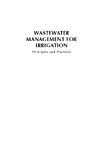Please use this identifier to cite or link to this item:
http://lib.hpu.edu.vn/handle/123456789/22447| Title: | Wastewater management for irrigation: principles and practices |
| Authors: | Goyal, Megh Raj Tripathi, Vinod K. |
| Keywords: | Wastewater management Irrigation water Water reuse Technology |
| Issue Date: | 2016 |
| Publisher: | Apple Academic Press |
| Series/Report no.: | Research advances in sustainable micro irrigation 8 |
| Abstract: | The reuse of wastewater in irrigation is being practiced only recently to solve water scarcity problems in agriculture. Management of water, soil, crop and operational procedures, including precautions to protect farm workers, play an important role in the successful use of sewage effluent for irrigation. Appropriate water management practices must be followed to prevent salinization. If salt is not flushed out of the root zone by leaching and removed from the soil by effective drainage, salinity problems can build up rapidly. Leaching and drainage are, thus, two important water management practices to avoid salinization of soils. One of the options that may be available to farmers is the blending of treated sewage with conventional sources of water to obtain a blended water of acceptable salinity level. |
| URI: | https://lib.hpu.edu.vn/handle/123456789/22447 |
| ISBN: | 978-1-77188-120-3 9781498727396 |
| Appears in Collections: | Technology |
Files in This Item:
| File | Description | Size | Format | |
|---|---|---|---|---|
| 110_Wastewater_management_for_irrigation_principles_and_practices.pdf Restricted Access | 8.71 MB | Adobe PDF |  View/Open Request a copy |
Items in DSpace are protected by copyright, with all rights reserved, unless otherwise indicated.
